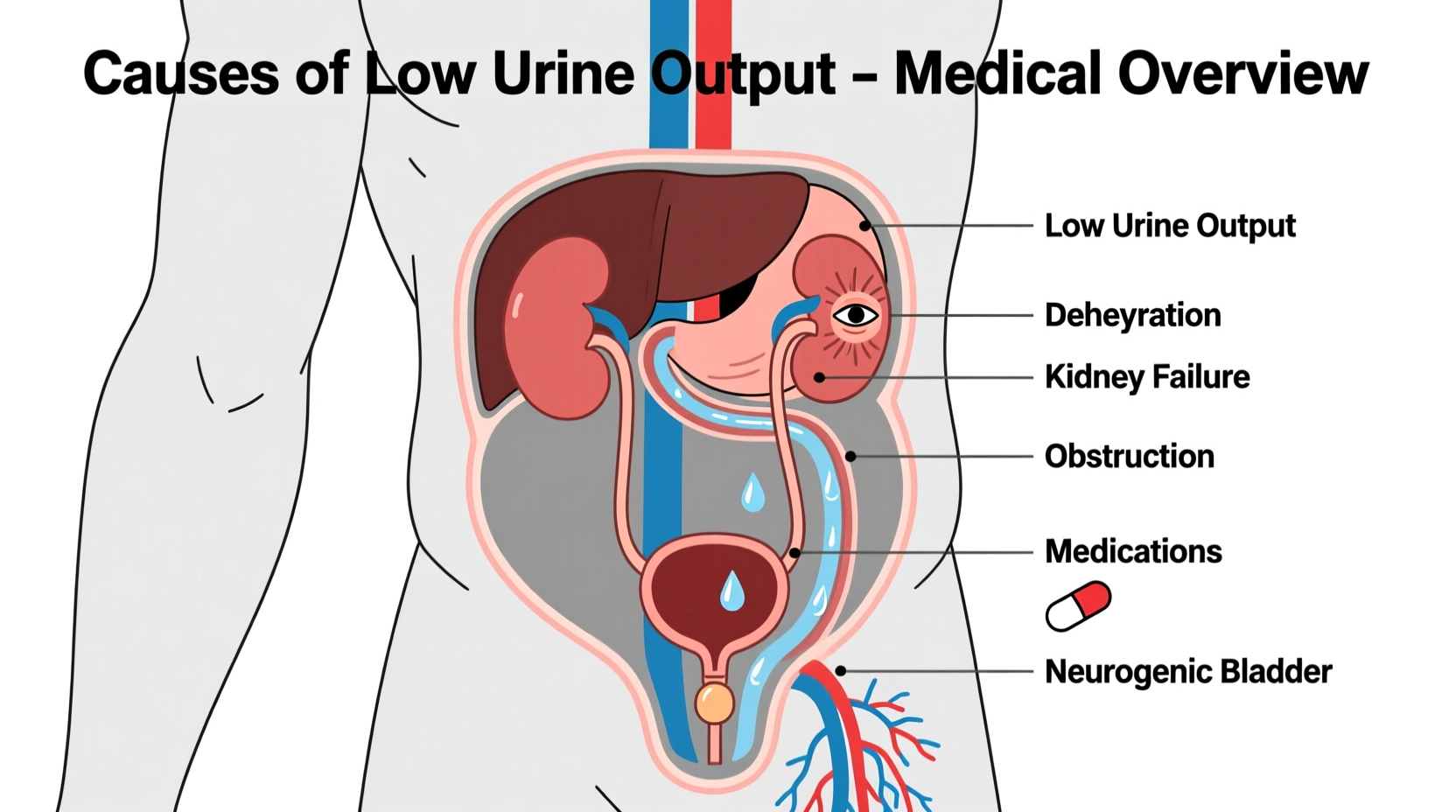Reduced urine output—also known medically as oliguria—can be a subtle but significant sign that something is off in your body. While occasional changes in urination are normal, consistently producing less urine than usual (typically under 400 milliliters per day in adults) may point to dehydration, medication side effects, or more serious underlying conditions. Understanding why this happens empowers you to take timely action and protect your kidney health.
What Is Considered Low Urine Output?

For most adults, normal urine output ranges between 800 and 2,000 milliliters per day, assuming a typical fluid intake of about 2 liters. Oliguria is defined as producing less than 400 mL of urine in 24 hours. In clinical settings, doctors also monitor hourly output: less than 30 mL per hour in adults is considered low and warrants evaluation.
It’s important to distinguish between simply urinating less frequently and actually producing a smaller total volume. Some people may go fewer times to the bathroom due to reduced fluid intake, while others may feel the urge but pass only small amounts—which could signal a blockage or bladder issue rather than systemic kidney dysfunction.
Common Causes of Decreased Urine Production
Low urine output doesn’t always mean kidney failure. Often, simpler explanations exist. Here are the most frequent contributors:
- Dehydration: The leading cause. Not drinking enough fluids, excessive sweating, vomiting, or diarrhea can all reduce blood volume and prompt the kidneys to conserve water.
- Medications: Diuretics (paradoxically), NSAIDs like ibuprofen, ACE inhibitors, and certain antibiotics can affect kidney blood flow or function.
- Heart Failure: Reduced cardiac output means less blood reaches the kidneys, lowering filtration rates.
- Urinary Tract Obstruction: Kidney stones, an enlarged prostate, tumors, or strictures can block urine flow from the bladder or ureters.
- Acute Kidney Injury (AKI): A sudden decline in kidney function due to shock, infection, toxins, or surgery.
When Low Urine Output Signals a Serious Problem
While mild dehydration is easily reversible, some causes of low urine output require urgent attention. These include:
- Severe Hypovolemia: Significant blood or fluid loss from trauma, burns, or prolonged illness reduces circulating volume, impairing kidney perfusion.
- Sepsis: A life-threatening response to infection that can lead to septic shock and multi-organ failure, including acute kidney injury.
- Glomerulonephritis: Inflammation of the kidney’s filtering units, often following infections or autoimmune diseases.
- Bilateral Ureteral Obstruction: Blockage in both ureters prevents urine from reaching the bladder, increasing pressure on the kidneys.
- Hepatorenal Syndrome: A complication of advanced liver disease where kidney function deteriorates despite no direct kidney damage.
“Oliguria is one of the earliest warning signs of acute kidney injury. Recognizing it early can prevent progression to dialysis.” — Dr. Alan Reyes, Nephrologist at Boston Medical Center
Step-by-Step Guide: What to Do If You’re Peeing Less
If you notice a sustained decrease in urine output, especially with other symptoms, follow this timeline to assess and respond appropriately:
- Day 1 – Self-Assessment: Evaluate fluid intake, recent illness, medications, and activity level. Have you been sweating heavily? Vomiting? Taking new pills?
- Day 2 – Hydration Trial: Increase water intake gradually. Aim for clear or light-yellow urine. Avoid alcohol and caffeine, which can worsen dehydration.
- Day 3 – Monitor Symptoms: Watch for swelling, fatigue, shortness of breath, confusion, or dark-colored urine. These suggest worsening kidney function.
- Within 72 Hours – Seek Medical Evaluation: Visit a healthcare provider for blood tests (creatinine, BUN), urinalysis, and possibly imaging (ultrasound) to check kidney structure and flow.
- Immediate Care if Critical Signs Appear: No urine for 12+ hours, chest pain, severe dizziness, or altered mental status require emergency care.
Do’s and Don’ts When Experiencing Low Urine Output
| Do | Don’t |
|---|---|
| Drink water steadily throughout the day | Chug large volumes quickly if you have heart or kidney issues |
| Keep a log of how often and how much you urinate | Ignore persistent low output for more than two days |
| Review medications with your doctor | Stop prescribed drugs without consulting a professional |
| Seek help if you have swelling or shortness of breath | Assume it's “just dehydration” if symptoms persist |
Real-Life Example: A Case of Missed Warning Signs
Mark, a 58-year-old construction worker, noticed he hadn’t urinated much after a long shift in 90°F heat. He chalked it up to not drinking enough water and didn’t think much of it. Over the next 36 hours, his output remained minimal, and he began feeling nauseous and weak. By the time he visited urgent care, blood tests revealed elevated creatinine levels—indicating acute kidney injury from severe dehydration. With IV fluids and monitoring, Mark recovered fully, but his doctors emphasized that another day could have led to permanent damage.
This case illustrates how environmental factors combined with delayed recognition can escalate a manageable issue into a medical emergency.
Prevention Checklist: Protect Your Kidney Health
- ✅ Drink adequate fluids based on activity and climate (usually 6–8 glasses daily)
- ✅ Monitor urine color—aim for pale yellow
- ✅ Manage chronic conditions like diabetes and high blood pressure
- ✅ Avoid overuse of NSAIDs, especially when dehydrated
- ✅ Get regular blood work, particularly if at risk for kidney disease
- ✅ Respond promptly to vomiting, diarrhea, or fever with extra fluids
Frequently Asked Questions
Can holding your pee cause low urine output?
No—holding urine delays elimination but doesn’t reduce total production. However, chronic retention can lead to urinary tract infections or bladder dysfunction over time. True low output refers to decreased urine formation by the kidneys, not just infrequent voiding.
Is it normal to pee less when losing weight?
Initially, yes. Rapid weight loss, especially through low-carb diets, leads to water loss as glycogen stores are depleted. This may temporarily reduce urine volume. However, once stabilized, output should return to normal. Persistent low output during weight loss needs evaluation.
Can stress cause decreased urination?
Stress alone rarely causes clinically low urine output. However, anxiety can alter perception of bladder fullness or lead to behaviors like reduced fluid intake. Chronic stress impacts blood pressure and hormonal balance, indirectly affecting kidney regulation over time.
Conclusion: Listen to Your Body’s Signals
Your urine output is a direct reflection of your internal environment—how hydrated you are, how well your kidneys filter waste, and how efficiently your circulatory system delivers blood to vital organs. Peeing less isn't something to brush off, especially when accompanied by other symptoms. Early awareness and intervention can prevent complications ranging from electrolyte imbalances to irreversible kidney damage.









 浙公网安备
33010002000092号
浙公网安备
33010002000092号 浙B2-20120091-4
浙B2-20120091-4
Comments
No comments yet. Why don't you start the discussion?